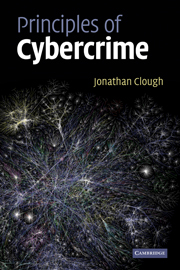Book contents
- Frontmatter
- Contents
- Preface
- Acknowledgements
- List of abbreviations
- Table of cases
- Table of legislation
- PART I Introduction
- PART II Computer as target
- 2 Computer as target
- 3 Access offences
- 4 Impairment of data
- 5 Misuse of devices
- 6 Interception of data
- PART III Fraud and related offences
- PART IV Content-related offences
- PART V Offences against the person
- PART VI Jurisdiction
- Bibliography
- Index
6 - Interception of data
Published online by Cambridge University Press: 05 June 2012
- Frontmatter
- Contents
- Preface
- Acknowledgements
- List of abbreviations
- Table of cases
- Table of legislation
- PART I Introduction
- PART II Computer as target
- 2 Computer as target
- 3 Access offences
- 4 Impairment of data
- 5 Misuse of devices
- 6 Interception of data
- PART III Fraud and related offences
- PART IV Content-related offences
- PART V Offences against the person
- PART VI Jurisdiction
- Bibliography
- Index
Summary
The changing nature of telecommunications
We have seen in previous chapters that offences concerned with unauthorised ‘access’ to a computer evolved to being more generally concerned with the protection of data stored in a computer. In this chapter we consider the next layer of vulnerability: when the data leaves the computer and is communicated to others. Whether it is an email passing over a telecommunications network, an instant message on a LAN, or images sent over a wireless connection, there is the potential for that data to be intercepted. The unauthorised uses to which such information may be put are as varied as the communications themselves, but include harassment, blackmail, fraud or economic espionage.
Prior to the advent of the Internet, mass communication was still dominated by conventional post and telephony. The Internet has transformed the way in which we communicate by allowing large amounts of data to be transferred rapidly and easily, throughout the world, at low cost. Emails, SMS/MMS and instant messaging are increasingly the preferred modes of personal and business communication. VoIP and similar mechanisms compete with conventional telephony by providing real-time audio and visual communication over the Internet. The convergence of technology means that mobile phones are now small networked computers. This increasing connectivity is accompanied by a commensurate increase in opportunities for data to be intercepted.
Offences concerned with the unauthorised interception of communications are not new and are found in each jurisdiction.
- Type
- Chapter
- Information
- Principles of Cybercrime , pp. 135 - 180Publisher: Cambridge University PressPrint publication year: 2010



